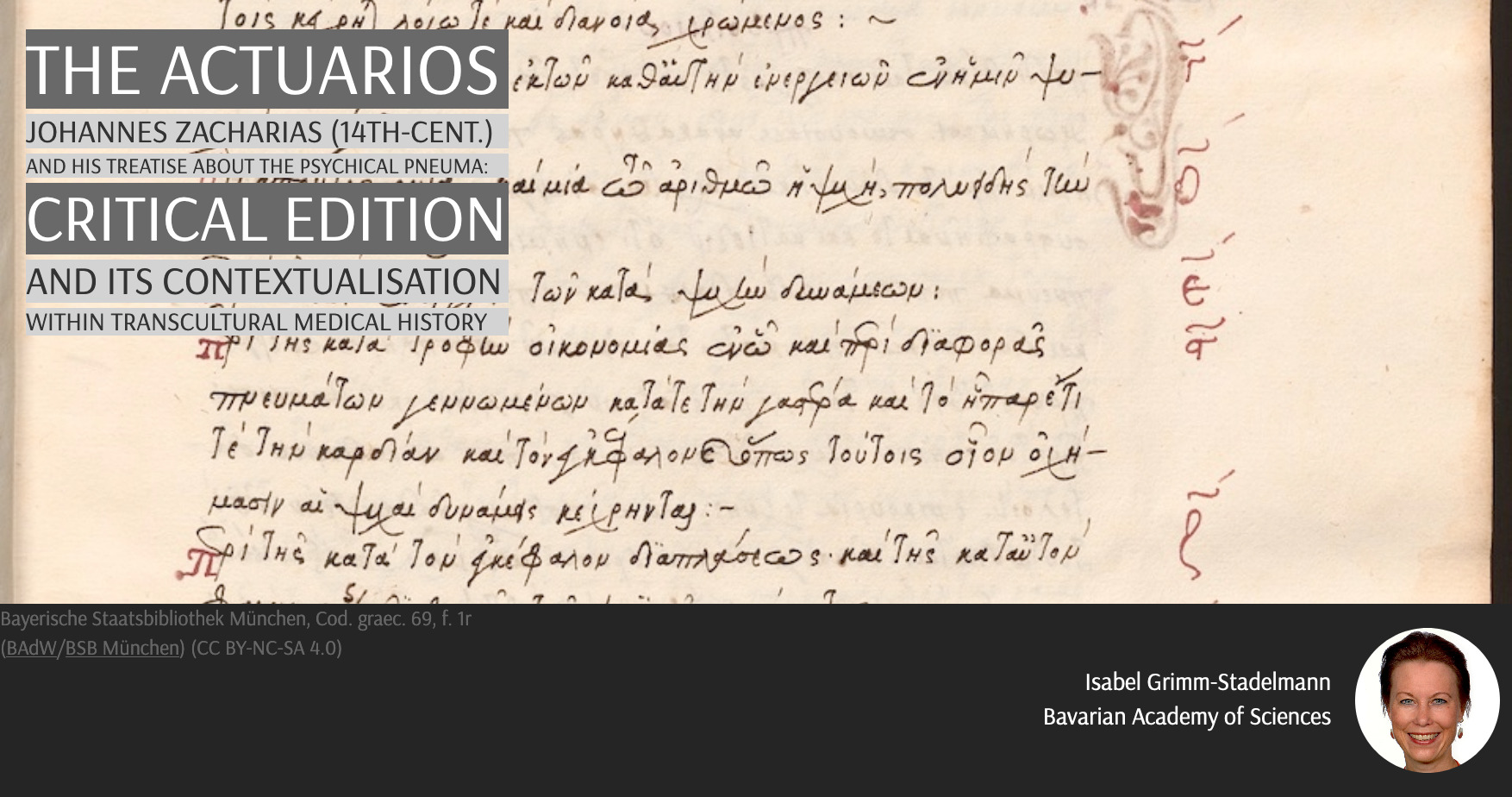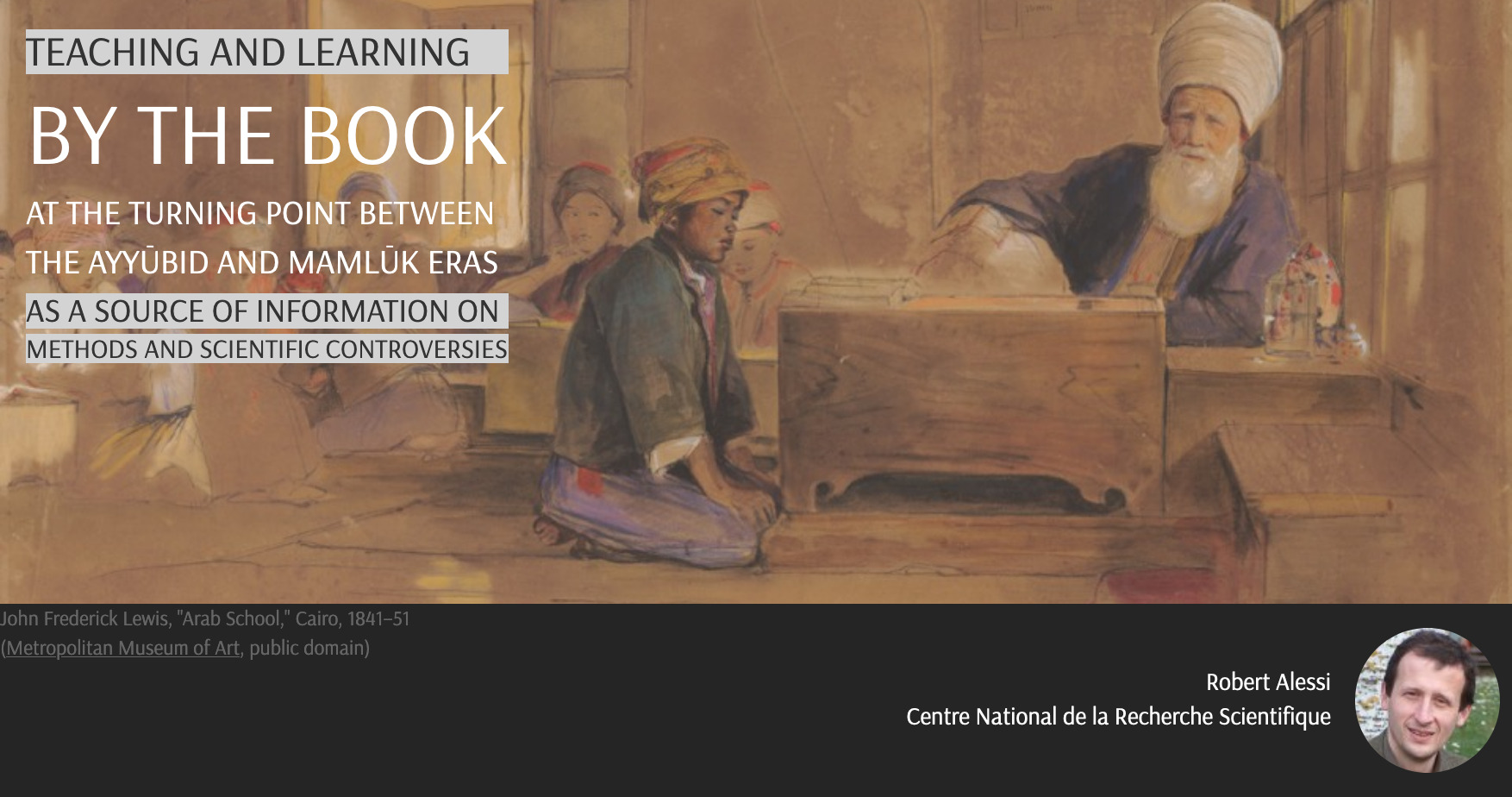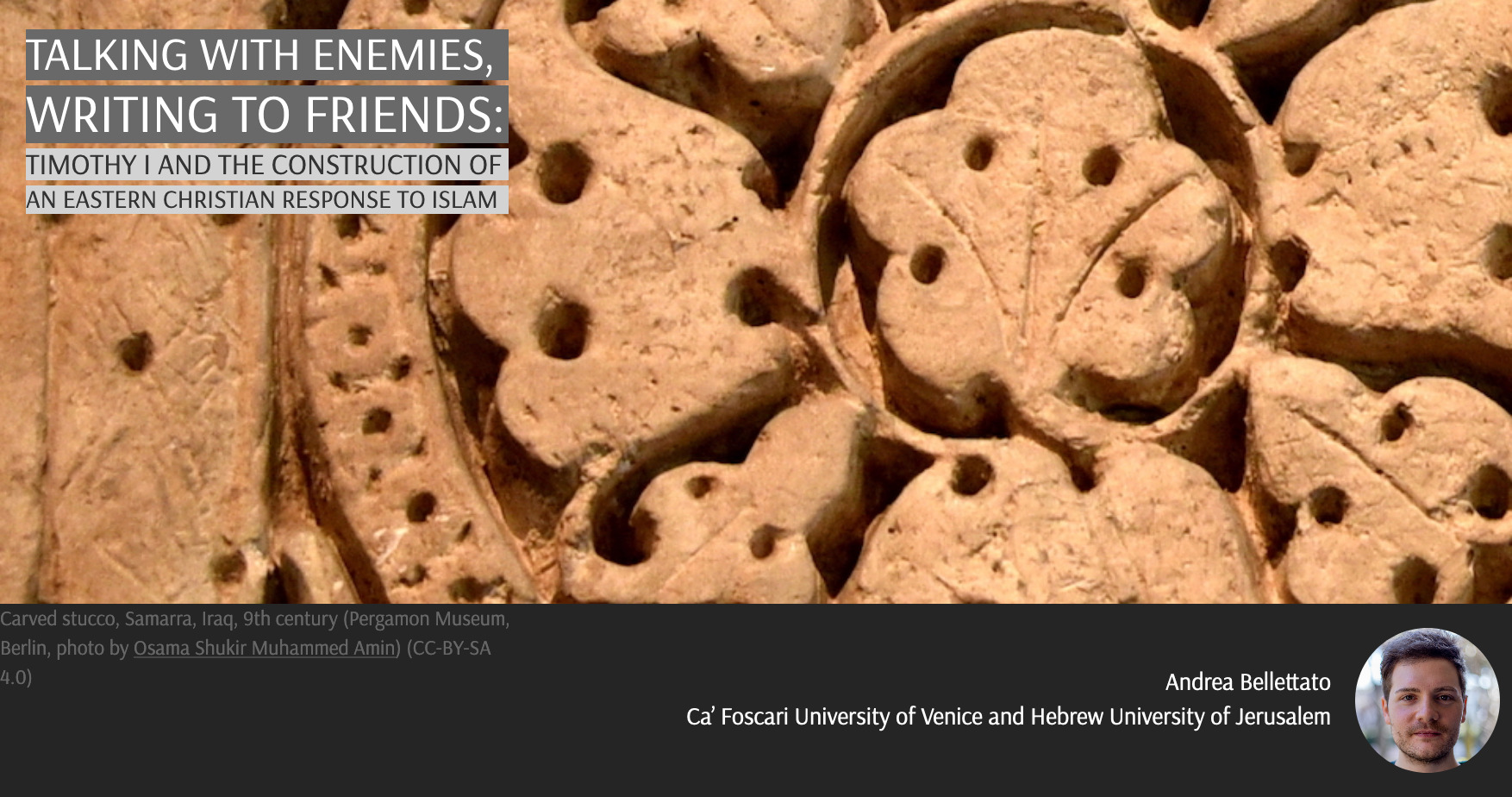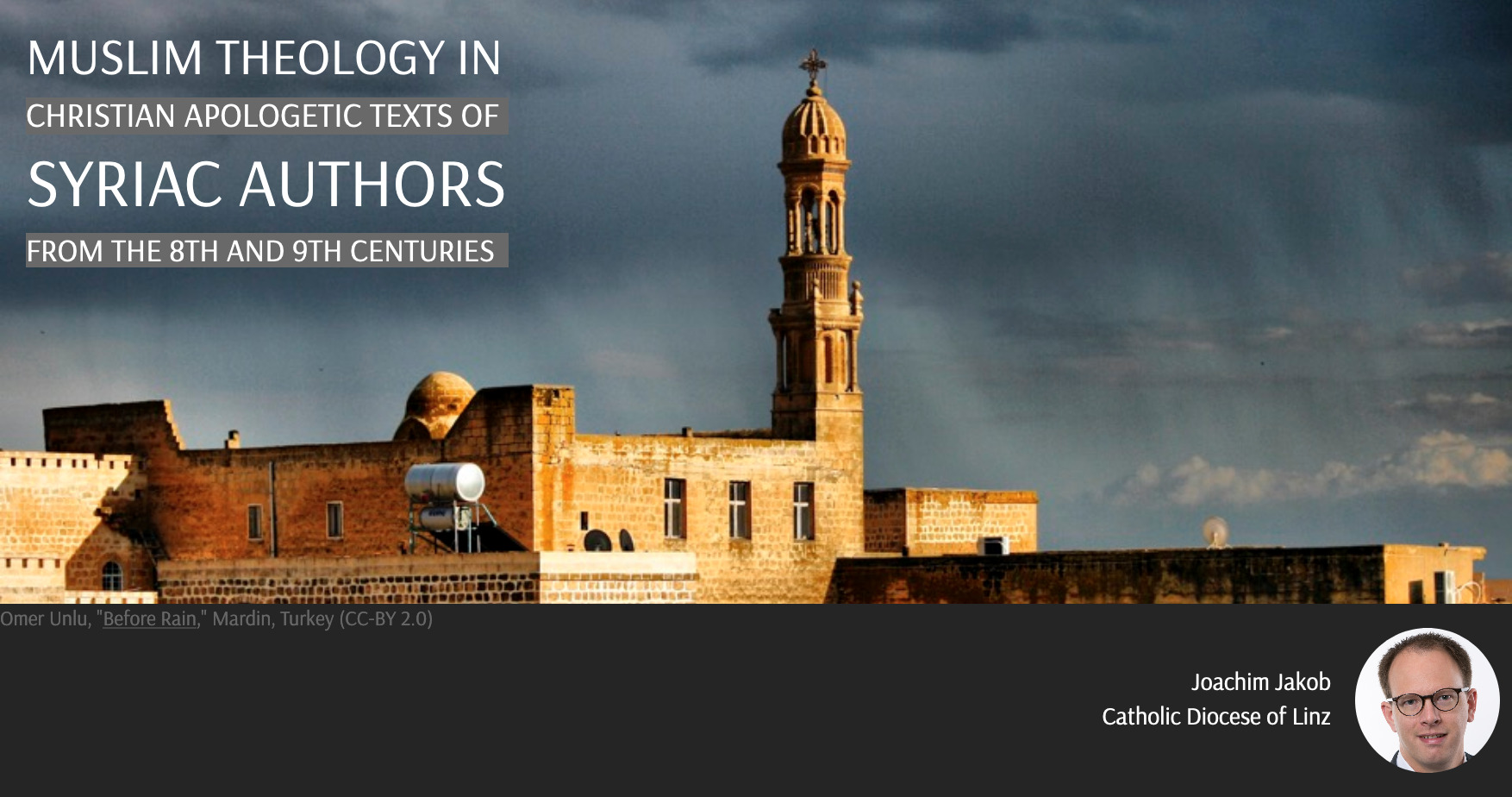Text for 1st email (@MalindaT) (please send on 25.11.)
Dear All,
Our Virtual Forum series starts December off with a bang! This coming Tuesday (Dec. 1) we'll be hearing a project demo from Isabel Grimm-Stadelmann about Byzantine transcultural medical history and a research paper discussion from Robert Alessi on teaching and learning in the Ayyūbid and Mamlūk eras. This will be followed on Friday (Dec. 4) by research paper discussions from Andrea Bellettato and Joachim Jakob on Syriac responses to Islam. You can register now for both sessions, to read and comment on the papers that will be discussed during the live Zoom session. The full program of the virtual forum Jews, Christians, and Muslims as Colleagues and Collaborators in the Abbasid Near East is at https://usaybia.net/forum2020.
Here's the info for Tuesday.

Tuesday, December 1
16:00 Project Demo
The Actuarios Johannes Zacharias (14th-Cent.) and His Treatise about the Psychical Pneuma: Critical Edition and its Contextualisation within Transcultural Medical History
Event info and registration: https://usaybia.net/forum2020#11-grimm-stadelmann
Isabel Grimm-Stadelmann Bavarian Academy of Sciences
Being an Actuarios, Johannes Zacharias was a high-ranked physician in a transcultural Byzantine surrounding, characterised by a highly developed hospital culture. Within this setting the therapeutical dialogue between Byzantine physicians and their Jewish, Arabic and Latin colleagues was widespread and of great importance for the continuous evaluation of therapeutical concepts and the relevant medical literature. The manuscripts transmitting Johannes' treatise provide interesting insights into this process.
Isabel Grimm-Stadelmann (Ph.D., PD Dr. Habil.) is a researcher at the Bavarian Academy of Sciences, where she focuses on the critical edition of the late-Byzantine Aktuarios Ioannes Zacharias’ treatise on the psychical pneuma.

Tuesday, December 1
16:30 Paper Discussion
Teaching and Learning by the Book at the Turning Point Between the Ayyūbid and Mamlūk Eras as a Source of Information on Methods and Scientific Controversies
Event info and registration: https://usaybia.net/forum2020#12-alessi
Robert Alessi Centre National de la Recherche Scientifique
Islamic medicine certainly inherited a refined tradition from Greek medicine, but also has seen an important shift in medical training. First, the structures radically changed: they went from an era where medicine passed on from father to son, or where being the disciple of a master was very much like becoming part of his family—to an era where several types of medical training coexisted: from father to son, by teaching oneself (viz. by reading handbooks) or by resorting to the master through classes in hospitals or medical schools. Obviously, the first two ways must be taken into consideration for approaching properly how the sources spread into the Arabic world and how they were handled by scholars, many of them were travellers and collectors of books. Nevertheless, the latter, to which one must add discussions between trained physicians, gives us a lively and vivid insight into the way Arabic medicine evolved through debates between prominent figures.
In this respect, in connection with the transmission of medical art and the handbooks, of great interest are the issues related to the religious affiliation of the physicians, either Christians, Jews or Muslims, at the turning point between the Ayyūbid and the Mamlūk eras (in the XIIIth century AD) between Damascus and Cairo, for they all did refer to Greek sources, but in different ways. On this account, of particular interest are the literary patterns that are used to put on stage these controversies as they may rely on traditions already found centuries ago, in authors such as al-Jāḥiẓ or al-Tawḥīdī.
We will try to explore the most significant examples provided by Ibn Abī Uṣaybiʿah, some of which deal with teaching, others with research, showing active discussions between physicians, regardless of religion, facilitated by the sultan himself who provided a special place at his residence to be used as a majlis for research. Surely, depending on whether they were Muslims, Jews or Christians, the social positions they held were different, but also complementary as they had different access to the sources. Even the most prominent Muslim physicians had to rely on colleagues who could recall Galenic sources word for word. This point explains to a large extent the faithfulness of the text preserved in Ibn Abī Uṣaybiʿah to the Greek sources.
Robert Alessi is a researcher affiliated with the French Centre National de la Recherche Scientifique (UMR 8167, Orient & Méditerranée, Paris-Sorbonne, France). His area of research is Greek and Arabic medicine, particularly the transmission of medical knowledge and the formation of the physicians.
How it works
The virtual forum is conceived as an opportunity to discuss the state of research on interreligious knowledge exchange. Half-hour project demos will showcase ongoing projects in the area, while one-hour research paper discussions are a chance to interact on a deeper level with researchers who are in the process of formulating approaches to the subject.
- Students, academics, and anyone else interested may register by clicking on any of the registration links. This will take you to a Zoom page, where you can select any or all of the nine sessions to attend virtually. The number of Zoom participants for each session is limited to 100.
- Registered participants will be sent drafts of research papers to read and comment on ahead of time. We'll use the web tool Hypothes.is to do this collaboratively. You can get a free Hypothes.is account here, and you'll receive an email ahead of the session containing a link to read the paper and another link to join the private Hypothes.is group where you can comment or ask questions.
- During the live Zoom sessions, you'll hear two presentations and, for research paper discussions, 1–2 responses from invited participants. The remainder of the time will be open for you to interact with the speaker, so come with questions!
- Proceedings: Revised papers from the forum will be submitted to a special issue of medieval worlds: comparative & interdisciplinary studies, a peer-reviewed, open-access journal published by the Austrian Academy of Sciences (ISSN 2412-3196).
All times are Central European Time (CET). Logistical support has been provided by Usaybia.net team members Vanessa Birkhahn and Malinda Tolay.
Background
From the eighth century to the thirteenth century and beyond, scholars in the Abbasid and neighboring realms pioneered study in medicine, mathematics, the astral arts, and many other disciplines. Scholarly treatises from that era together with biographical sources such as Ibn Abī Uṣaybiʿa's History of Physicians and documentary texts from the Cairo Genizah show that this scholarly activity was not isolated to a single community. Instead, it emerged from a rich exchange between scholars affiliated with many different communities: Jewish, Christian, Muslim, Zoroastrian, Hindu, Samaritan, and others. Sometimes this exchange occurred through books or letters while at other times it was face-to-face in formal, institutional settings, side-by-side in the workplace, or even mediated through patrons, servants, or family members.
In the framework of the project “Communities of Knowledge” (funded by the German Federal Ministry of Education and Research), we are hosting a series of discussions on the topic of person-to-person knowledge exchange among Near Eastern communities during Abbasid rule.
All best,
(on behalf of) Nathan Gibson
Nathan P. Gibson, Ph.D. Principal Investigator, Communities of Knowledge/Wissensgemeinschaften (usaybia.net) Ludwig-Maximilians-Universität München Institut für den Nahen und Mittleren Osten
Associated Projects: Syriaca.org, Biblia Arabica


Two weeks before
25.11.
Event Management
Publicity
Mailing Lists see 1st email below
Posts
27.11.
Posts
30.11.
1.12.
Posts
2.12
Mailing Lists see 2nd email below
Event Management
3.12.
5.12.
During event
Moderation (@vanessa612, @MalindaT)
Timeline 1.12.
15:50 meet & greet 16:00 forum introduction, Zoom tips (send chat message), introduce presenter 16:05 project demo 16:20 Q&A 16:25 feedback poll 16:30 introduce presenter 16:35 presentation 16:50 response 16:55 follow-up 17:00 general discussion 17:25 feedback poll
Timeline 4.12.
15:50 meet & greet 16:00 forum introduction, Zoom tips (send chat message), introduce presenter 16:05 presentation 1 16:20 response 16:25 follow-up 16:30 general discussion 16:55 feedback poll 17:00 introduce presenter 17:05 presentation 2 17:20 response 17:25 follow-up 17:30 general discussion 17:55 feedback poll
Links